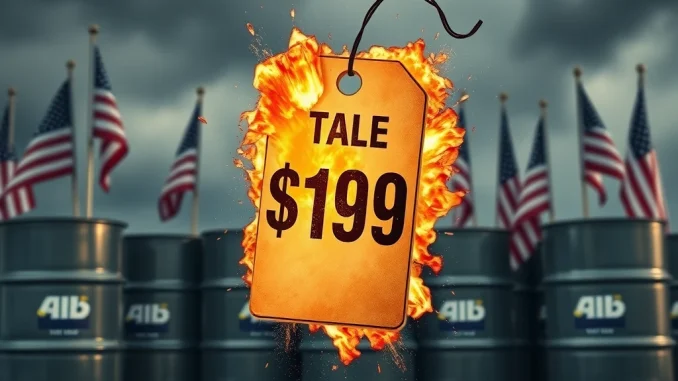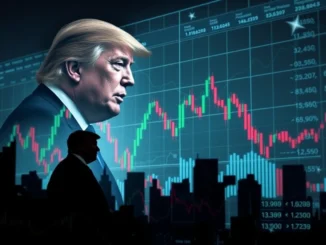
Buckle up, because the global economy might be in for a wild ride! Former Harvard President Lawrence Summers has dropped a bombshell, comparing the potential economic fallout of former US President Donald Trump’s proposed tariff policies to nothing less than doubling oil prices. Imagine the shockwaves that would send through markets – and your wallet. Let’s dive into why Summers is sounding the alarm and what this could mean for everyone.
Unveiling the Staggering Economic Impact of Trump Tariffs
In a stark assessment posted on X (formerly Twitter) on April 6th, Summers didn’t mince words. He likened the potential damage of Trump’s tariff plans to a massive economic earthquake, estimating a potential cost nearing a jaw-dropping $30 trillion. To put that into perspective, that’s larger than the GDP of the entire European Union! He argues that these measures, far from being beneficial, could inflict serious harm on the U.S. economy and, by extension, the global financial landscape. This isn’t just about trade; it’s about the potential for significant economic pain for consumers and businesses alike.
Why are Trump Tariffs Considered So ‘Masochistic’?
Summers didn’t just call the tariffs expensive; he labeled them “masochistic.” But what exactly does that mean in economic terms? Here’s a breakdown:
- Self-Inflicted Wound: Tariffs are essentially taxes on imported goods. While they might seem like they punish foreign producers, in reality, a significant portion of the cost is often passed on to domestic consumers and businesses who rely on those imports. This increases the cost of goods, reduces purchasing power, and can fuel inflation.
- Trade Wars and Retaliation: Imposing tariffs is rarely a one-sided affair. Other countries are likely to retaliate with their own tariffs on U.S. exports. This tit-for-tat escalation can lead to damaging trade wars, disrupting global supply chains and harming export-oriented industries in the U.S.
- Reduced Competitiveness: Higher import costs can make U.S. businesses less competitive in the global market. They may face increased input costs, making their products more expensive compared to foreign competitors who don’t face the same tariff burdens.
- Historical Context: Summers points out that this type of aggressive tariff policy is unprecedented in recent U.S. history. He emphasizes the “masochistic” nature by highlighting that it’s a self-harming strategy, inflicting pain on the U.S. economy in the pursuit of questionable benefits.
Doubling Oil Prices: A Powerful Analogy for Economic Shock
Why did Summers choose to compare tariffs to doubling oil prices? This analogy is incredibly powerful because it immediately conveys the magnitude of the potential economic disruption. Consider the impact of oil prices doubling:
| Impact Area | Consequences of Doubled Oil Prices | Similar Consequences from Trump Tariffs |
|---|---|---|
| Consumer Spending | Higher gasoline prices, increased heating/cooling costs, reduced disposable income for other goods and services. | Higher prices for imported goods, increased costs for businesses using imported inputs, reduced purchasing power for consumers. |
| Inflation | Significant upward pressure on overall inflation, as energy costs are a major component of many goods and services. | Increased prices across a wide range of imported goods, contributing to broader inflationary pressures in the economy. |
| Economic Growth | Reduced economic activity due to decreased consumer spending and business investment, potential for recessionary pressures. | Potential slowdown in economic growth due to reduced trade, higher costs for businesses, and decreased consumer demand. |
| Market Volatility | Increased uncertainty and volatility in financial markets due to energy price fluctuations and economic instability. | Uncertainty and volatility in markets due to trade policy shifts, potential for trade wars, and concerns about economic impact. |
The analogy highlights that both scenarios – doubled oil prices and widespread tariffs – represent a significant negative supply shock to the economy, leading to higher prices and reduced economic output. It’s a stark warning about the potential for tariffs to trigger widespread economic pain.
Trade Policy and the Cryptocurrency Connection: Is There One?
While Trump’s trade policy might seem distant from the world of cryptocurrency, economic shifts of this magnitude can have ripple effects across all markets, including digital assets. Here’s how:
- Inflation Hedge Narrative: If tariffs contribute to rising inflation, as Summers suggests, it could strengthen the narrative of Bitcoin and other cryptocurrencies as inflation hedges. Investors might turn to digital assets as a store of value if they perceive traditional currencies are being eroded by inflation.
- Economic Uncertainty: Periods of economic uncertainty often drive investors towards alternative assets. If trade wars and tariff-induced economic slowdowns create instability, cryptocurrencies could be seen as a less correlated asset class, attracting investment seeking diversification.
- Global Economic Shifts: Major shifts in global trade dynamics can influence capital flows and currency valuations. This, in turn, can impact the cryptocurrency market, which is inherently global and sensitive to macroeconomic trends.
However, it’s crucial to note that the relationship is complex and not always direct. Cryptocurrency markets are also driven by their own internal dynamics, technological developments, and regulatory factors.
Navigating the Uncertainties: Actionable Insights
So, what can you do in the face of such economic uncertainties?
- Stay Informed: Keep a close eye on developments in trade policy and economic indicators. Understanding the potential impacts of tariffs is crucial for making informed financial decisions.
- Diversify Investments: A diversified investment portfolio can help mitigate risks associated with economic shocks. Consider a mix of asset classes, including traditional and alternative investments.
- Consider Long-Term Strategies: Economic cycles are a natural part of the financial landscape. Focus on long-term investment strategies that can weather periods of volatility and uncertainty.
- Understand Inflation Dynamics: Educate yourself about inflation and its potential impact on your finances. This knowledge will help you make informed decisions about savings, investments, and spending.
Conclusion: A Stark Warning and a Call for Vigilance
Lawrence Summers’ comparison of Trump’s tariffs to doubling oil prices is a powerful and unsettling warning. It underscores the potentially devastating economic consequences of aggressive trade policies. Whether or not these tariffs come to pass in their most extreme form, Summers’ analysis serves as a critical reminder of the interconnectedness of the global economy and the far-reaching impacts of trade policy decisions. As individuals and investors, staying informed, understanding the potential risks, and preparing for economic shifts are paramount in navigating these uncertain times. The future of trade and its impact on the global economy – and potentially the cryptocurrency space – remains a story that is still unfolding.



